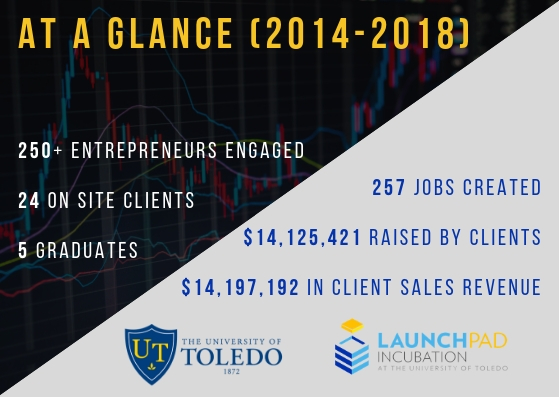UToledo innovates
Opportunities abound to engage University entrepreneurs
By Laurie B. Davis
Think of a UToledo faculty member whose research focuses on curing a disease or adding value to people’s lives through a better drug therapy, a new medical device or a web application. At UToledo, that’s easy to do because University professors across many disciplines are consistently innovating.

“The University of Toledo is among the leaders in faculty participation in the National Science Foundation’s Innovation-Corps Program,” says Rapino. “Out of 200 schools nationally, UT is in the top 10. We’re a bright, shining star recognized by the National Science Foundation” as an institution where NSF programs based on technology ideas are active.
The University is a National Science Foundation I-Corps Site, which offers the NSF’s expertise in educating emerging entrepreneurs about the customer discovery process and the commercial potential for their research or ideas. Genide and Rapino often help write grant proposals to obtain funding for new products or startups, and the NSF has been one of those funders.
It’s All About Process
Many ideas from entrepreneurs require adjustments, and some may need to pivot to something different than the original idea. “There’s a way to determine if the idea has legs. We’re experts at providing them with a process to go to the market and look,” says Rapino. “The process works at almost every stage of an idea’s life,” he adds.
The key is knowing what already exists in the market and being able to identify a gap, something that may be missing for consumers in a currently available product. This preliminary research can prevent the premature development of an idea. “You let the market determine the value, the worth of the idea, and help the entrepreneur to be a good steward of the value of that idea,” says Rapino.
There also are times when Genide and Rapino have to deliver bad news to an emerging entrepreneur that the idea for their “unique” product or service is not so unique. “We’re doing them a service because we’re saving them time, money and anguish, from building something that no one wants or is already being sold.”
Outside of the common areas on campus that produce technologies, such as engineering, natural sciences and mathematics, medicine and pharmacology, clients from the Judith Herb College of Education and the College of Arts and Letters also developed ideas through the NSF I-Corps Site program.
A client from the Department of Theatre and Film produced training modules for medical students and residents to learn how to interact with real patients, for example, when they need to discuss negative news. “Theatre students are trained to serve as professional patients for these kinds of trainings, providing the realism the medical students and residents need,” says Rapino.
A Herb Education client built a new web platform for conducting teacher evaluations. “It is more efficient and much more communicative with the teachers while taking actionable corrections immediately,” says Genide. “So, teachers would have to go through video platforms if a deficiency is noted.”
The Many Possibilities
The University operates three incubator facilities that provide specialized equipment, laboratory, office and manufacturing spaces — the Research and Technology Complex I, The Laboratory Incubation Center, and the Nitschke Technology Commercialization Complex, where the Launchpad Incubation program resides.
 Not everyone wants to sell a product or form a company, but the venture development program offers a list of possibilities for students, faculty members and staff members, depending on their goals, such as:
Not everyone wants to sell a product or form a company, but the venture development program offers a list of possibilities for students, faculty members and staff members, depending on their goals, such as:
- Form companies around your ideas
- Get grants and additional funding: SBIR, STTR, TVSF
- Take your existing tech and research to the next level
- Make new student and faculty connections
- Build your personal connections to industry and others
- Be part of a startup
- Learn how to innovate and achieve success at your job
“We provide a call to action that appeals to everyone,” says Rapino.
Genide and Rapino welcome any member of the University community to connect with them to talk about any of the listed action items.
They also encourage UToledo alumni to get involved with the Launchpad Incubation program. “There are alumni who have industry connections and technical domain knowledge that could be very useful to people, processes and startups within the University,” says Rapino. Opportunities to share advice might include evaluating technologies or making industry connections for existing technologies. “We’re interested in alumni opinions, knowledge and input,” he adds.
Rapino also believes alumni would benefit their own careers by learning more about the entrepreneurial process. “We can help them acquire the soft skills they need by connecting with us and connecting to a team working on a company. It’s a way for them to serve the University and serve their own career.”






